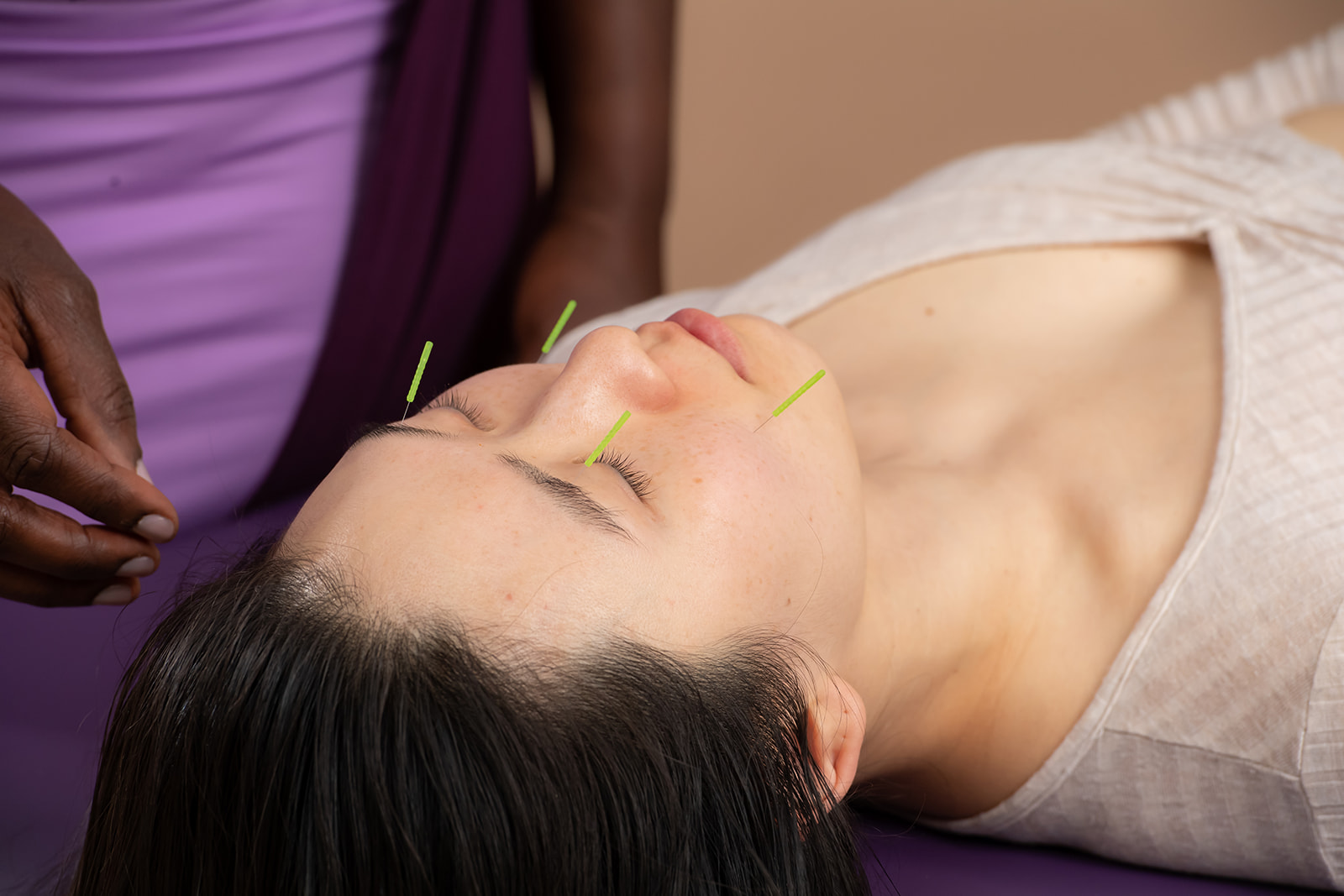Share
In this Article
Key Takeaways
| Topic | Summary |
|---|---|
| Understanding Stress | Recognize stress symptoms like anxiety and insomnia. Practice daily stress-reduction techniques to improve mental clarity. |
| Acupuncture Mechanisms | Acupuncture releases endorphins and regulates the nervous system. Schedule regular sessions for enhanced mental focus. |
| Key Acupuncture Points | Target Du 20 for mental sharpness and Yin Tang for concentration. Request focus on these points during sessions. |
| Practical Application | Start with weekly sessions for 4-6 weeks. Combine with daily mindfulness. Track improvements and adjust as needed. |
| Recommended Services and Products | |
Healing Packages
 |
Holistic treatments combining acupuncture with complementary therapies for stress relief and cognitive enhancement. Read More |
Acupuncture Services
 |
Targeted traditional and facial acupuncture treatments for improved mental focus and overall well-being. Read More |
As the founder of CARRINNA and a Joyful Aging Expert, I’ve dedicated my life to helping people achieve holistic well-being. Today, I want to share with you the incredible power of acupuncture for memory and concentration, especially in our increasingly stressful world. In this article, we’ll explore how this ancient practice can be a game-changer for your mental focus and overall cognitive function.

Get expert tips on healthy living and aging gracefully at 40 and beyond from me.
Success! Now check your email to confirm your subscription.
Understanding Stress and Its Impact on Mental Focus

Let’s face it: stress is an unavoidable part of modern life. But what exactly is stress, and how does it affect our ability to think clearly and stay focused?
The Physiology of Stress
Stress is our body’s natural response to challenging or threatening situations. When we encounter stress, our body goes into “fight-or-flight” mode, releasing hormones like cortisol and adrenaline. While this response can be helpful in short bursts, chronic stress can wreak havoc on our mental and physical health.
The impact of stress on our cognitive abilities is particularly concerning. When we’re constantly under pressure, our brain’s resources are diverted to deal with the perceived threat, leaving less energy for tasks that require concentration and mental clarity. This is why you might find it hard to focus on work or remember important details when you’re feeling overwhelmed.
The Toll of Chronic Stress
Recent studies have shed light on just how prevalent stress-related mental health issues are in our society. According to research involving 548 adults, the prevalence rates of depression, anxiety, and stress were found to be 45%, 47%, and 18%, respectively. These numbers are staggering and highlight the urgent need for effective stress management techniques.
Moreover, the COVID-19 pandemic has exacerbated these issues. A study conducted during the pandemic revealed that 34% of participants reported depression, while 31% experienced anxiety. These statistics underscore the importance of finding reliable methods to combat stress and improve mental well-being.
The Cognitive Cost of Stress

Chronic stress doesn’t just make us feel bad; it actively impairs our cognitive abilities. Research has shown that individuals under chronic stress exhibit slower task responses and lower accuracy in attention-related tasks. This suggests that stress depletes our cognitive resources, making it difficult to maintain focus and process information efficiently.
Furthermore, stress affects our executive function – the mental processes that enable us to plan, focus attention, remember instructions, and juggle multiple tasks successfully. When stress takes its toll, we find ourselves struggling with tasks that require alertness and concentration.
The Role of Acupuncture in Stress Management
Now that we understand the profound impact of stress on our mental faculties, let’s explore how acupuncture can help. As an acupuncturist with years of experience, I’ve seen firsthand how this ancient practice can transform people’s lives, especially when it comes to managing stress and improving cognitive function.
A Holistic Approach to Well-being
Acupuncture is rooted in Traditional Chinese Medicine (TCM), a holistic approach to health that has been refined over thousands of years. At its core, TCM is about restoring balance within the body. We believe that when your body’s energy, or Qi, flows freely, you experience optimal health in both body and mind.
Stress, according to TCM principles, disrupts this delicate balance. It’s like throwing a wrench into a finely tuned machine. Acupuncture works to remove that wrench and get everything running smoothly again.
How Acupuncture Works Its Magic
You might be wondering, “How can tiny needles help with something as complex as stress and mental focus?” Let me break it down for you:
- Endorphin Release: When we insert acupuncture needles at specific points on your body, it stimulates the release of endorphins. These are your body’s natural feel-good chemicals. They act as mood enhancers and pain relievers, contributing to a sense of well-being and relaxation. It’s like giving your brain a natural, healthy high!
- Nervous System Regulation: One of the most powerful effects of acupuncture is its ability to balance the sympathetic (fight-or-flight) and parasympathetic (rest-and-digest) nervous systems. By doing so, it helps reduce stress hormone levels, particularly cortisol. This rebalancing act is crucial for improving mental clarity and focus.
- Improved Sleep: Many of my clients report better sleep quality after starting acupuncture treatments. And we all know how crucial good sleep is for mental clarity and focus. Studies have consistently shown that acupuncture can enhance sleep quality, which in turn boosts cognitive function.
The Science Behind Acupuncture’s Effectiveness
If you’re a skeptic (and believe me, I’ve met plenty!), you’ll be interested to know that there’s a growing body of scientific evidence supporting the efficacy of acupuncture for stress relief and cognitive enhancement.
A study published in the Journal of Neural Regeneration Research demonstrated that acupuncture could enhance cognitive function and neural plasticity. This is huge because it suggests that acupuncture doesn’t just make you feel better – it actually helps your brain work better!
Another research paper found that participants receiving verum (real) acupuncture reported a significantly greater reduction in stress compared to those receiving sham acupuncture. This shows that the effects of acupuncture go beyond just the placebo effect.
Acupuncture Points for Enhancing Focus
Now, let’s get specific. In my practice, I’ve found certain acupuncture points to be particularly effective for improving focus and cognitive function. Here are a couple of key points you should know about:
Du 20 (Governing Vessel)
Located at the top of your head, Du 20 is like the crown jewel of acupuncture points for mental clarity. When we stimulate this point, it’s as if we’re turning on a light in a dim room. Clients often report feeling more alert and mentally sharp after treatment of this point.
Yin Tang
Positioned between your eyebrows, Yin Tang is often called the “third eye” point. It’s fantastic for promoting concentration and reducing mental distractions. I like to think of it as a reset button for your mind, helping to clear away mental clutter and improve focus.
These are just two of the many points we might use in a treatment focused on improving mental clarity and focus. The beauty of acupuncture is that we can tailor the treatment to your specific needs and symptoms.
Practical Applications and Recommendations
So, how can you incorporate acupuncture into your life to reap these cognitive benefits? Here are some practical tips:
- Regular Sessions: Like any health practice, consistency is key with acupuncture. I typically recommend starting with weekly sessions for 4-6 weeks, then adjusting based on your response and needs.
- Combine with Other Techniques: While acupuncture is powerful on its own, it works even better when combined with other stress-management techniques. Consider pairing your acupuncture treatments with mindfulness meditation, regular exercise, or yoga for maximum benefit.
- Listen to Your Body: Pay attention to how you feel after treatments. Many people notice immediate effects, while for others, the benefits build up over time. There’s no one-size-fits-all approach, so be patient and attentive to your body’s responses.
- Explore Healing Packages: At CARRINNA, we offer Healing Packages that combine acupuncture with other complementary therapies. These packages are designed to provide a holistic approach to improving your mental and physical well-being.
- Consider Facial Acupuncture: While we’re primarily focusing on cognitive benefits, don’t overlook the power of facial acupuncture. Not only can it give you a natural, youthful glow, but many clients report feeling mentally refreshed after these treatments too. You can learn more about our facial acupuncture services here.
The Future of Acupuncture in Cognitive Health
As we look to the future, I’m excited about the growing recognition of acupuncture’s role in cognitive health. More and more research is being conducted to understand the mechanisms behind acupuncture’s effects on the brain.
For instance, studies are exploring how acupuncture might help with conditions like mild cognitive impairment and even early-stage Alzheimer’s disease. While we’re still in the early stages of this research, the potential is incredibly promising.
Moreover, as our understanding of the brain-body connection deepens, practices like acupuncture that take a holistic approach to health are likely to gain even more traction in mainstream medicine.
Conclusion
In our fast-paced world, maintaining mental focus is crucial. Acupuncture for memory and concentration offers a natural, effective method for enhancing cognitive function and managing stress. Whether you’re a student, professional, or simply seeking mental clarity, acupuncture could be the key to unlocking your cognitive potential.
Remember, your mind is your most valuable asset. By incorporating acupuncture into your wellness routine, you’re investing in your overall quality of life. Consider booking a session at CARRINNA to experience the benefits firsthand. With acupuncture, you’re not just improving your focus – you’re empowering your mind to thrive in any situation.







